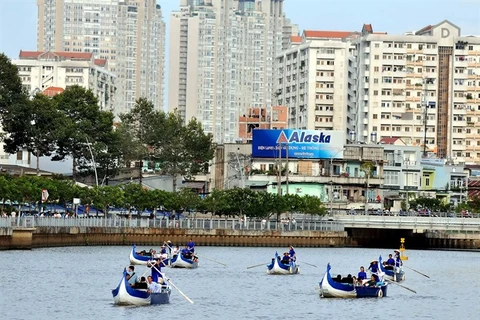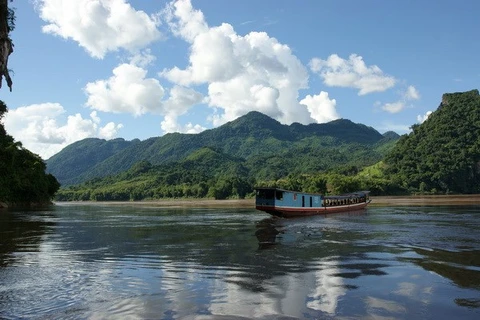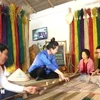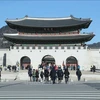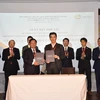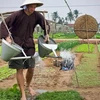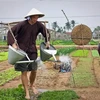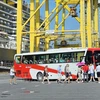Hanoi (VNA) - Associate Professor Pham Trung Luong, former deputy director of the Institute for Tourism Development under the Ministry of Culture, Sports and Tourism, speaks to Bnews.vn on how to turn the tourism industry into a spearhead economic sector.
Q: What are the most notable successes of the Vietnam Tourism sector in 2016?
A: The high number of foreign tourists visiting our country. It was the first time we welcomed 10 million foreign visitors, along with 62 million Vietnamese tourists. As a result, tourism revenue reached a record 400 trillion VND (17.73 billion USD) and generated more than 1.7 million jobs.
The development of the tourism sector has also created a push for related economic sectors to develop, including commerce and transportation.
However, in the 2016 global survey on tourism competitiveness, our tourist industry only ranked 75 out of 141 participating countries. With such an international ranking, Vietnam needs to do a lot more to attract foreign tourists, particularly through its Law on Tourism - the revised version of which is expected to be adopted by the National Assembly soon.
Q: In your opinion, what were the key reasons for the 2016 success?
A: The most important factor was the remarkable effort by all staff in the industry over many years, particularly in 2016, starting with action plans and policies formulated by the central Government, down to the grass roots level. All 63 provinces and cities have come up with their own specific plans and tourism products in order to attract more tourists.
If in the past, a tour across two or three provinces or several regions was not listed on many tour programmes, in 2016 it became popular and was highly appreciated by the tourists.
The second success I should mention was the Government’s decision to give visa waivers to tourists from certain countries and to Overseas Vietnamese. This policy has been described as a major breakthrough that led to the increase in tourism.
And last but not least, Vietnam is a safe destination for foreign tourists in the context of instabilities in the world.
Q: According to the Asia Pacific Tourism Association, only some 6 percent of tourists return to Vietnam after their first time. Does the data tell you anything?
A: I was a little bit upset. It is a good lesson for us and we should think positively. If the purpose of a tour is just sightseeing, we will go to that place one time only and reserve our time and money to explore other places.
In other words, whether the visitors come back or not, depends on several factors. But in this case, we have to carry out a deep analysis to see whether tours are carefully arranged and conducted and whether the tourists were happy with them.
In my opinion, we should also arrange different forms of tourism like convention and exhibition tourism, or seminar tourism, shopping tourism and others.
Q: Do you have any comments on the Party Politburo resolution on turning the tourism sector into a key economic industry?
A: I can’t agree more with the goal set in the document.
However, from the perspective of a researcher, in order to turn the tourism sector into a key economic industry accounting for 10 percent of the GDP, there are quite a lot of things we have to do.
In 2016, as I have mentioned, our tourism industry ranked 75 of 141 countries participating in a survey on its competitive edge. Frankly speaking, our ranking is even lower than Indonesia, Thailand and Malaysia.
Q: In your opinion, what must the tourism industry do to achieve the goals set by the Party’s Resolution?
A: I don’t think the tourism sector can do by itself. It needs support from the whole of society and active participation of all sectors. The second point I want to mention is the imperative to change the concept of tourism development. Until now, when we talk about tourism development, the first and foremost we mention is the number of visitors. It is high time for us to look at another factor – the growth quality.
The growth quality means that tourists’ stay is longer and their spending higher; or that tours are providing more jobs. That’s why in my opinion, tourism must be developed to be sustainable, not for the sake of a running competition.-VNA
Q: What are the most notable successes of the Vietnam Tourism sector in 2016?
A: The high number of foreign tourists visiting our country. It was the first time we welcomed 10 million foreign visitors, along with 62 million Vietnamese tourists. As a result, tourism revenue reached a record 400 trillion VND (17.73 billion USD) and generated more than 1.7 million jobs.
The development of the tourism sector has also created a push for related economic sectors to develop, including commerce and transportation.
However, in the 2016 global survey on tourism competitiveness, our tourist industry only ranked 75 out of 141 participating countries. With such an international ranking, Vietnam needs to do a lot more to attract foreign tourists, particularly through its Law on Tourism - the revised version of which is expected to be adopted by the National Assembly soon.
Q: In your opinion, what were the key reasons for the 2016 success?
A: The most important factor was the remarkable effort by all staff in the industry over many years, particularly in 2016, starting with action plans and policies formulated by the central Government, down to the grass roots level. All 63 provinces and cities have come up with their own specific plans and tourism products in order to attract more tourists.
If in the past, a tour across two or three provinces or several regions was not listed on many tour programmes, in 2016 it became popular and was highly appreciated by the tourists.
The second success I should mention was the Government’s decision to give visa waivers to tourists from certain countries and to Overseas Vietnamese. This policy has been described as a major breakthrough that led to the increase in tourism.
And last but not least, Vietnam is a safe destination for foreign tourists in the context of instabilities in the world.
Q: According to the Asia Pacific Tourism Association, only some 6 percent of tourists return to Vietnam after their first time. Does the data tell you anything?
A: I was a little bit upset. It is a good lesson for us and we should think positively. If the purpose of a tour is just sightseeing, we will go to that place one time only and reserve our time and money to explore other places.
In other words, whether the visitors come back or not, depends on several factors. But in this case, we have to carry out a deep analysis to see whether tours are carefully arranged and conducted and whether the tourists were happy with them.
In my opinion, we should also arrange different forms of tourism like convention and exhibition tourism, or seminar tourism, shopping tourism and others.
Q: Do you have any comments on the Party Politburo resolution on turning the tourism sector into a key economic industry?
A: I can’t agree more with the goal set in the document.
However, from the perspective of a researcher, in order to turn the tourism sector into a key economic industry accounting for 10 percent of the GDP, there are quite a lot of things we have to do.
In 2016, as I have mentioned, our tourism industry ranked 75 of 141 countries participating in a survey on its competitive edge. Frankly speaking, our ranking is even lower than Indonesia, Thailand and Malaysia.
Q: In your opinion, what must the tourism industry do to achieve the goals set by the Party’s Resolution?
A: I don’t think the tourism sector can do by itself. It needs support from the whole of society and active participation of all sectors. The second point I want to mention is the imperative to change the concept of tourism development. Until now, when we talk about tourism development, the first and foremost we mention is the number of visitors. It is high time for us to look at another factor – the growth quality.
The growth quality means that tourists’ stay is longer and their spending higher; or that tours are providing more jobs. That’s why in my opinion, tourism must be developed to be sustainable, not for the sake of a running competition.-VNA
VNA


